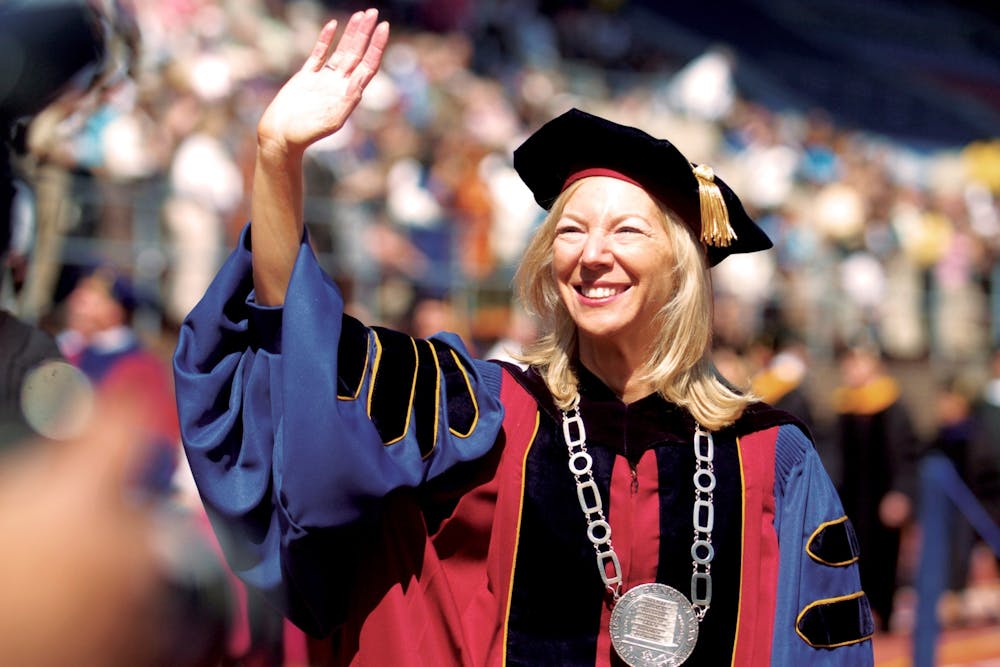
Three weeks ago, Penn President Amy Gutmann announced that she had been nominated by President Joe Biden to serve as the next United States ambassador to Germany. As she waits for the U.S. Senate to confirm her nomination, The Daily Pennsylvanian analyzed Gutmann's greatest accomplishments during her 17-year stretch as University president.
Gutmann, the longest-serving president in University history, was first appointed to the role in October of 2004. Her contract was extended twice in 2012 and 2016 and is set to expire in June 2022. Gutmann made an impact at Penn in a number of ways, most prominently on fundraising campaigns, programs for first-generation students, and campus expansion projects.
Here are some of Gutmann’s greatest accomplishments during her time at Penn.
Academics
Months after Gutmann was initially appointed President, she launched the Penn Integrates Knowledge program in 2004 to recruit “renowned scholars whose work draws from two or more academic disciplines” to Penn. Today, the program includes more than 20 different professors from across the University.
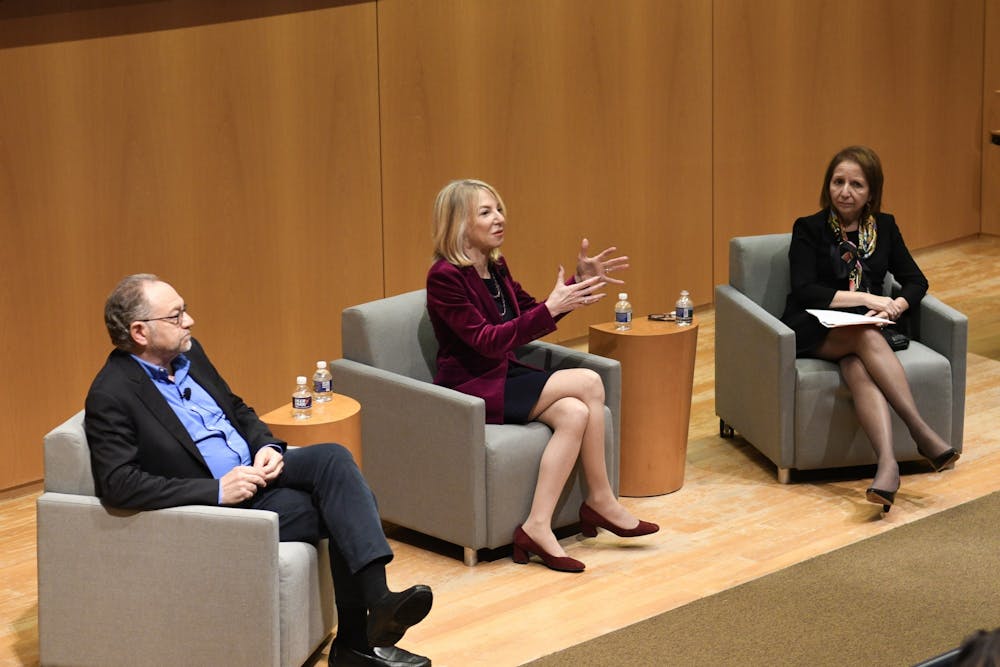
After Gutmann’s contract was extended in 2012, she spearheaded a variety of initiatives, including the construction of new buildings on campus and around the world.
In March 2013, Gutmann announced the opening of Perry World House, a hub for global engagement on Locust Walk. A year later, in June 2014, Gutmann announced the creation of the Penn Center for Innovation which is now located at the Pennovation Center.
“The Penn Center for Innovation also will transform our region’s capacity to support an ecosystem of innovative entrepreneurs, companies and workers all making essential contributions to our collective economic future,” Gutmann told Penn Today.
Gutmann solidified Penn’s global outreach in March 2015 with the opening of the Penn Wharton China Center in Beijing, which is now a hub in China for Penn students, faculty, staff, and alumni. The Center maintains contact with different institutions across China, facilitates Penn faculty and student research in China, and hosts alumni events, according to the website.
Most recently, Gutmann launched the Penn Biden Center for Diplomacy and Global Engagement in February 2018, one year after Biden was named a Penn professor. The Center offers internships to Penn students, as well as opportunities to dialogue over public policy issues.
“The unmatched personal connections Joe Biden has with world leaders is equally important to our students, our faculty, policymakers, and the work of this new Center,” Gutmann said at the Center’s official opening on Feb. 8.
Admissions and Financial Aid
As a first-generation college student herself, Gutmann has continually prioritized advancing accessibility to higher education for disadvantaged students, so much so that it is codified as one of the values in her Penn Compact, which outlines her strategic vision for the University.
“As a first-generation, low-income student myself, I know how life-changing financial aid can be," Gutmann told Penn Today in an interview about the Power of Penn fundraising campaign in 2018.
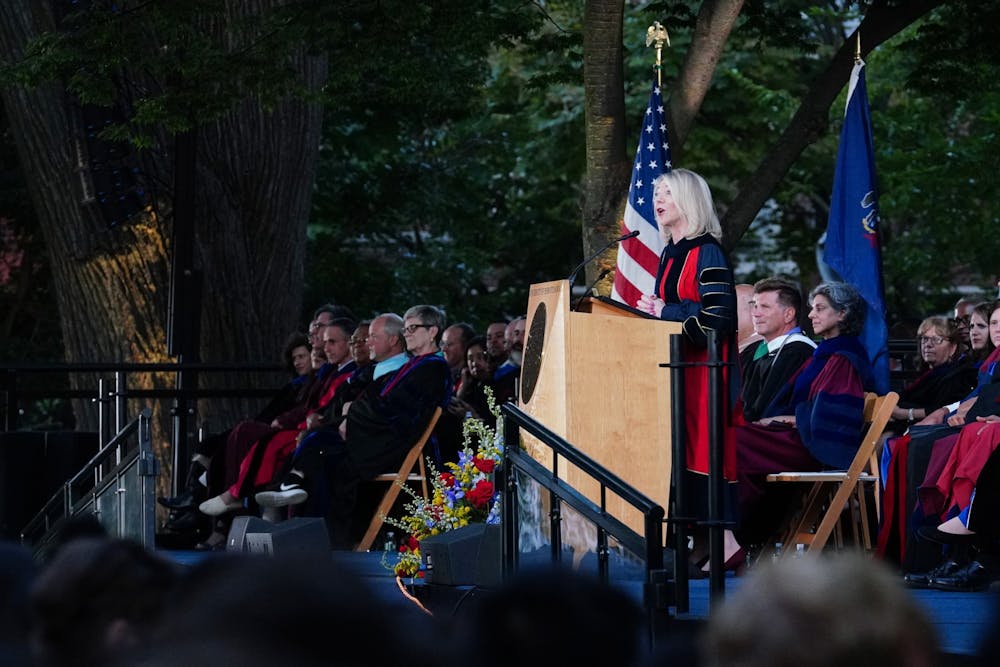
In 2008, Gutmann created Penn’s no-loan policy, which has enabled all dependent undergraduate students eligible for financial aid to receive loan-free aid packages, regardless of family income level.
Eight years later in October 2016, Penn became the second university in the Ivy League to open a center dedicated to supporting first-generation, low-income students. The FGLI Center is located in the Greenfield Intercultural Center and runs the FGLI food pantry, a variety of programming for students, and housed the FGLI donated textbook library until this year when the collection moved to Van Pelt.
In May 2018, Gutmann announced that Penn would expand its efforts to improve the experience of first-generation, low-income students by implementing a Penn First Plus office, which is now located in College Hall.
When Gutmann first became president in 2004, only one in 20 students at Penn were the first in their families to attend college. In the Class of 2025, 15% of admitted students identify as first-generation. Under Gutmann’s leadership, the number of students from low-income and middle-income college families has more than doubled, according to the Berggruen Institute.
Fundraising Campaigns
Gutmann has raised over $9 billion for Penn through various fundraising campaigns. The Making History campaign, which launched in October 2007, was Gutmann’s first campaign during her presidency. The campaign raised a total of $4.3 billion by the time it concluded in December 2012.
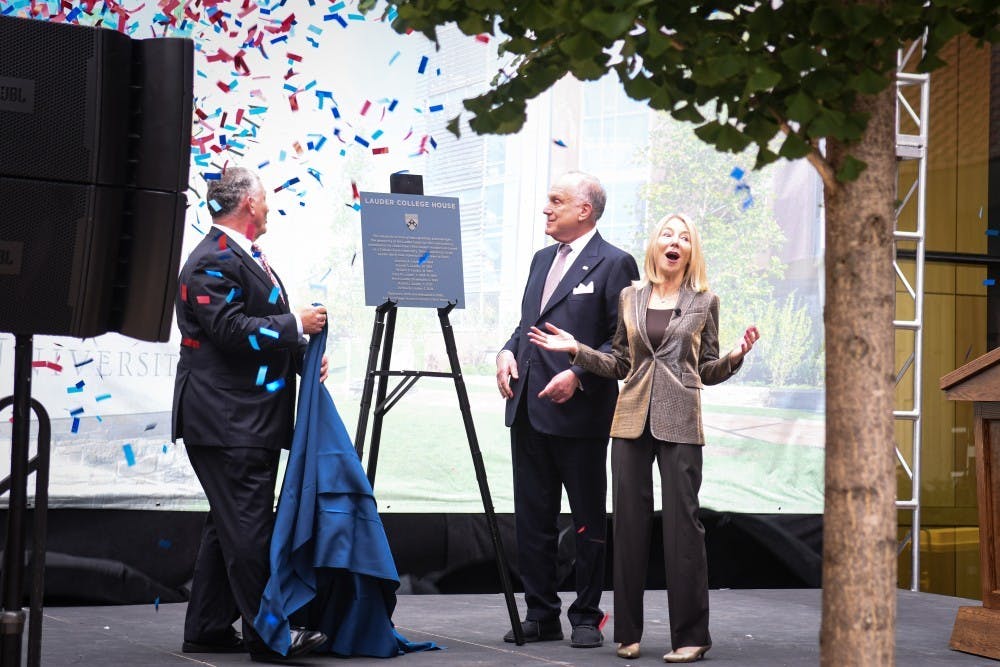
Years after the Making History campaign, Gutmann launched the Power of Penn Campaign in 2018 with a goal of raising $4.1 billion in four years, making it one of the most ambitious fundraising campaigns in University history. Gutmann raised over $3.3 billion for the University one year after its launch in 2019.
Student Life
Gutmann announced the creation of the Platt Student Performing Arts House, a hub for performing arts and theatre groups at Penn, in 2006. The center trains students passionate about pursuing the performing arts both as an extracurricular activity and as a career path.
To promote the importance of health and wellness, in April 2018, Gutmann announced the creation of the position of Chief Wellness Officer that would oversee Penn's Student Wellness Services, which includes Counseling and Psychological Services, the Student Health Service, and the Office of Alcohol and Other Drug Program Initiatives.

In an effort to build community among Penn first- and second-year students, Gutmann announced in September 2018 that all sophomores will be required to live on campus in college housing and purchase a dining plan beginning with the Class of 2024.
"We believe that a two-year College House system will measurably strengthen the sense of community among our first- and second-year students — promoting students’ achievement and well-being, enhancing support for students’ academic and social lives," wrote the email, which was signed by Penn President Amy Gutmann and Provost Wendell Pritchett.
Campus
Penn's campus looked very different when Gutmann first took office in 2004. Under Gutmann’s leadership, many notable campus buildings were announced and eventually constructed, including Lauder College House in 2014, the Perelman Center for Political Science and Economics in 2013, the Annenberg Public Policy Center in 2007, and more recently, New College House West in 2017.

In the past two years, Gutmann has also announced various renovations and art installations on Penn’s campus, including the construction of the “Brick House” statue on 34th and Walnut Street. The statute, a large sculpture of a Black woman’s head atop a round structure that suggests a skirt or building, was constructed in November 2020 and is meant to signify the University’s commitment to racial justice. This year, Penn also announced a $94 million project to renovate graduate student dorm Sansom Place East.
In September 2011, Gutmann successfully led a project converting a parking lot into Penn Park — a 24-acre green area located between Penn’s campus and Schuylkill River waterfront. The park includes Ace Adams Field, designed to accommodate soccer and lacrosse, the Clay W. Hamlin Outdoor Tennis Center, and other spaces for intramural sports teams to play.
West Philadelphia
Gutmann has also led multiple initiatives to benefit both the Penn community and the surrounding West Philadelphia community.
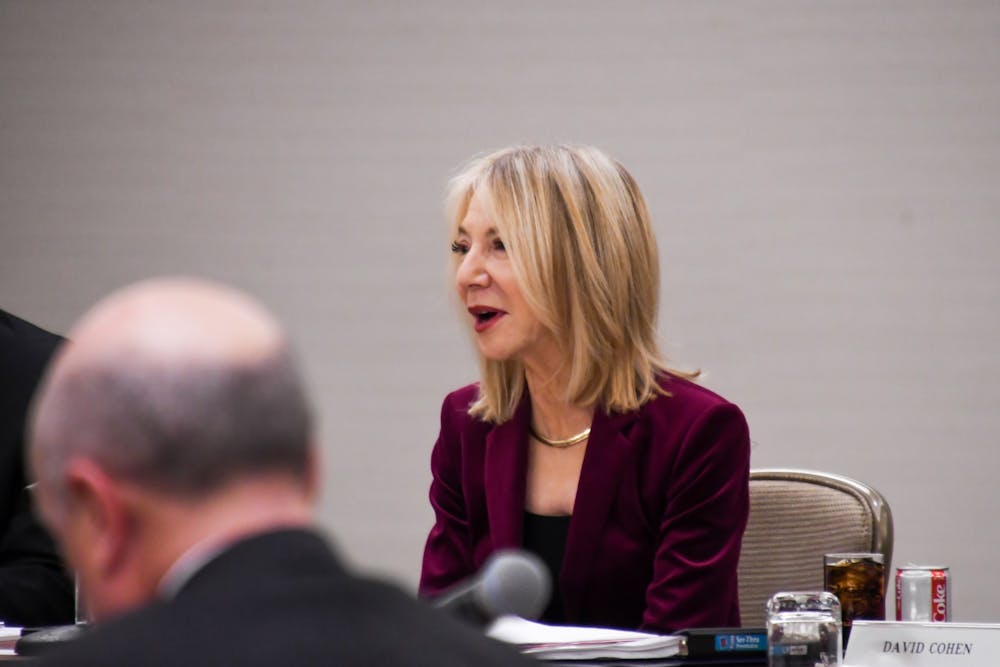
In September 2014, Gutmann announced President’s Engagement Prizes, which are awarded annually for Penn seniors to “design and undertake fully-funded local, national or global engagement projects during the first year after they graduate.” Many of the award-winning projects have addressed the needs of the Philadelphia community, including Be Body Positive Philly, which addresses eating disorder risk among Philadelphia high school students.
Gutmann also pledged $100 million to the School District of Philadelphia over the next 10 years to address environmental hazards in Philadelphia's schools, including asbestos and lead. This donation is the largest private contribution in the school district's history.
COVID-19
The COVID-19 pandemic presented unique challenges for Gutmann in the final years of her presidency. Following announcements from multiple other Ivy League universities, Gutmann moved all classes online and sent all undergraduate students home in March 2020, with the hope of re-opening campus in the fall semester.

Largely due to the unpredictable nature of the pandemic, the 2020-2021 school year was filled with many conflicting administrative decisions that reversed one another. In June of 2020, Gutmann initially announced that Penn would operate under a hybrid instruction model for the fall 2020 semester, welcoming students back to campus while keeping all classes virtual. Later in the summer on Aug. 4, Gutmann informed students that they would be required to self-administer a COVID-19 test mailed to them prior to move-in.
Penn, however, scrapped its plans for a hybrid semester just days later on Aug. 11, ensuring the fall 2020 semester would be conducted entirely online and remotely. In November of 2020, Gutmann announced that Penn would welcome undergraduate students back into on-campus housing.
In January 2021, Gutmann helped to launch the Penn Cares COVID-19 response program, which included weekly testing of students, faculty, and postdocs.
By the spring 2021 semester, Pfizer and Moderna vaccines were approved by the FDA, ushering in a new stage of the pandemic. As the pandemic entered its second year, Gutmann announced in April 2021 that Penn will require all students to receive the COVID-19 vaccine for the coming fall semester.
The Daily Pennsylvanian is an independent, student-run newspaper. Please consider making a donation to support the coverage that shapes the University. Your generosity ensures a future of strong journalism at Penn.
Donate




